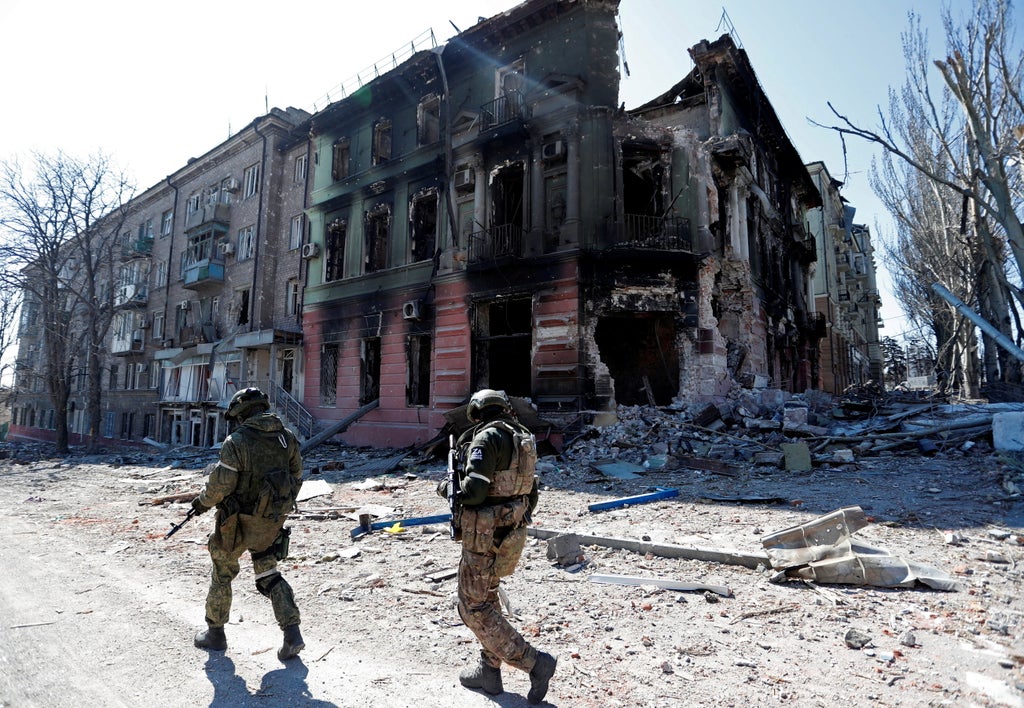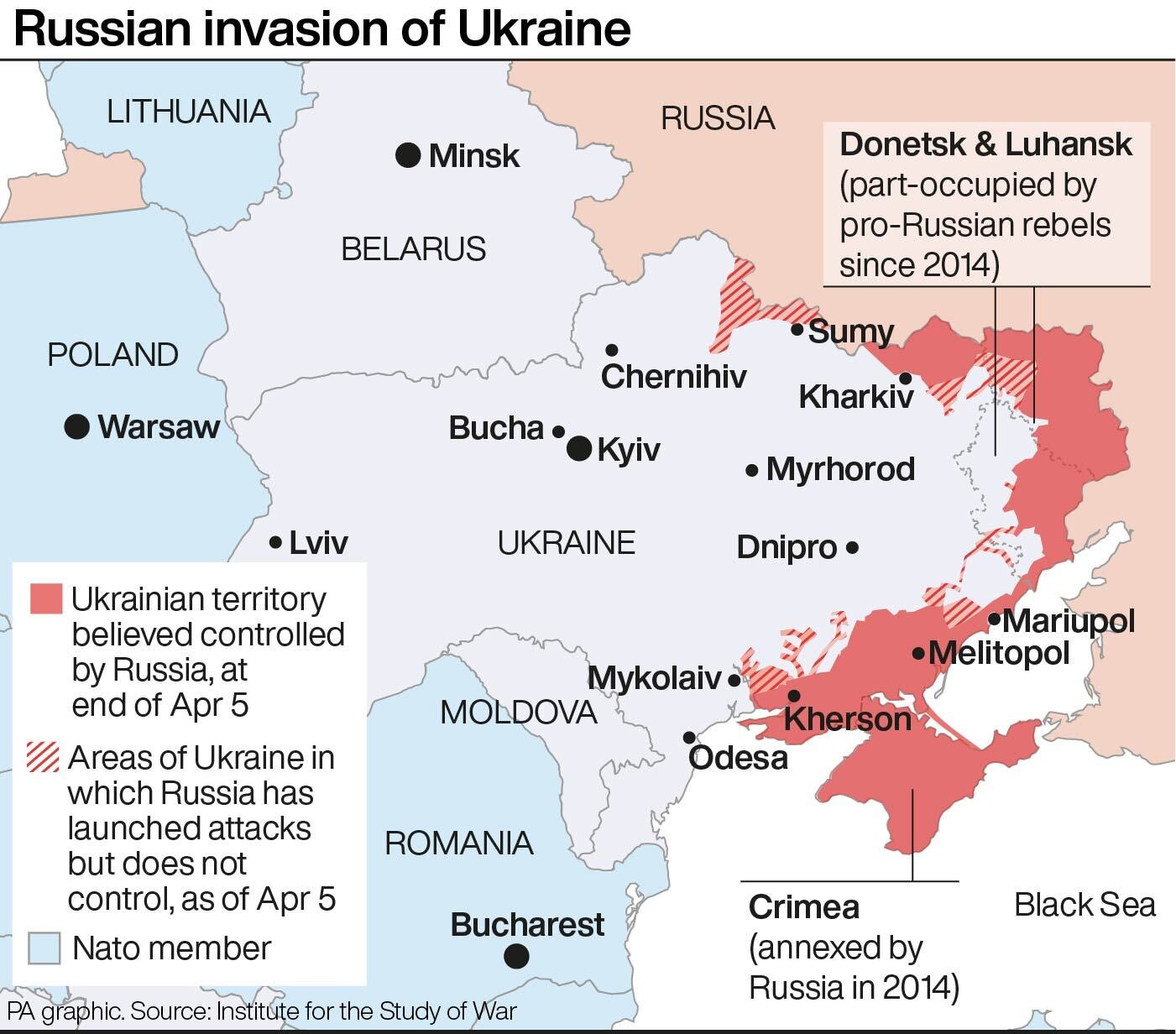
More than 10,000 civilians have died in the siege of Mariupol, the city’s mayor said on Monday amid fears Vladimir Putin plans to triple Russian forces in the east for a fresh assault on Donbas.
Vadym Boychenko said the death toll could surpass 20,000, with corpses “carpeted through the streets”.
He accused Russian forces of refusing to allow humanitarian convoys into the city in an attempt to conceal the carnage, and said many bodies had been taken to a shopping centre to be stored.
“Mobile crematoriums have arrived in the form of trucks: you open it, and there is a pipe inside and these bodies are burnt,” he told Associated Press.
In the northern city of Kharkiv, a residential area was struck by incoming fire on Monday afternoon, killing five people, including a child.
Western intelligence officials say Mr Putin has been forced to “diminish considerably” his plan in Ukraine, amid suggestions Mr Putin wants to take the Donbas region before 9 May, when Russia traditionally marks the Soviet victory against Nazi Germany with parades in Moscow.
Another official said: “I would imagine that, at outside estimates, what you're looking at is a force which is probably the Russians looking to double or even treble the amount of force that they bring into that Donbas area.
“But I would note that that is going to take some considerable time to bring them up to that sort of number. And even when they bring themselves to that number, there is a question over how effectively they can bring those forces into the battle.”
Some 38 battalion tactical groups (BTG) of the Russian army deployed to Ukraine – each made up of around 600-900 personnel – are now believed to be out of action after taking significant losses in men and materiel, up from 29 last week. This leaves Mr Putin with around 90 BTGs that could eventually potentially be deployed in Donbas.
The annual round of conscription has recently delivered an additional 130,000 young Russian men into the armed forces, but these will need considerable training before being deployed, and Mr Putin has instead been turning to veterans and reservists to bolster his army’s depleted ranks.
Elsewhere, Austrian chancellor Karl Nehammer said he met Mr Putin in Moscow for talks that were “very direct, open and tough”. In a statement released by his office, Mr Nehammer said his primary message to Mr Putin was “that this war needs to end, because in war both sides can only lose”. Mr Nehammer said he also raised the issue of war crimes committed by the Russian military and said those responsible “will be held to account”.
Downing Street confirmed further details of Boris Johnson’s trip to Kyiv to meet Ukrainian president Volodymyr Zelensky. The pair held talks over dinner after touring the capital’s Independence Square.
The foreign office said it was “shocked” by reports of mass graves being found in the village of Buzova outside Kyiv. Local officials said bodies showing “evidence of execution” had been discovered following the Russian withdrawal.
Buzova is near Bucha, another town where atrocities were discovered – although Russia has claimed the scenes from the aftermath of its occupation were staged.
Britain is increasingly worried that Russia could use white phosphorus munitions in its bombardment of Mariupol. White phosphorus is used for illumination at night or to create a smokescreen, but when it is deployed as a weapon it causes horrific burns.
Western officials think that, for Russia, bringing about the fall of Mariupol is seen as crucial for both freeing up troops for the fight in the Donbas but also for creating a route north for the Kremlin’s forces as they look to form a pincer movement on Ukrainian defenders in the east.
Meanwhile, Russian defence ministry spokesperson Major General Igor Konashenkov said his forces had used sea-launched Kalibr cruise missiles on Sunday to destroy four S-300 air defence missile launchers near the eastern Ukraine city of Dnipro.
Lubica Janikova, spokesperson for Slovakia's prime minister, denied that the S-300 system it recently sent Ukraine had been destroyed. She said any other claim is not true.
With their offensive in many parts of the country thwarted, Russian forces have relied increasingly on bombarding cities – a strategy that has left many urban areas flattened and killed thousands of people.

The war has also shattered Ukraine’s economy, with the World Bank estimating it will shrink by more than 45 per cent this year.
Meanwhile, the UN children’s agency said that nearly two-thirds of all Ukrainian children have fled their homes in the six weeks since Russia’s invasion began, and the United Nations has verified that 142 children have been killed and 229 injured, though the actual numbers are likely much higher.
Later on Monday, France’s foreign ministry declared six Russian agents – posing as diplomats – “persona non grata” after an investigation by the domestic intelligence services.
The six agents are being accused of working against France’s “national interest” following an investigation, reports suggest.
Reuters and Associated Press contributed to this report







